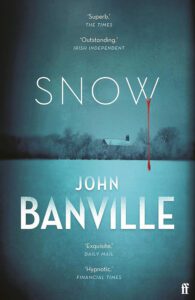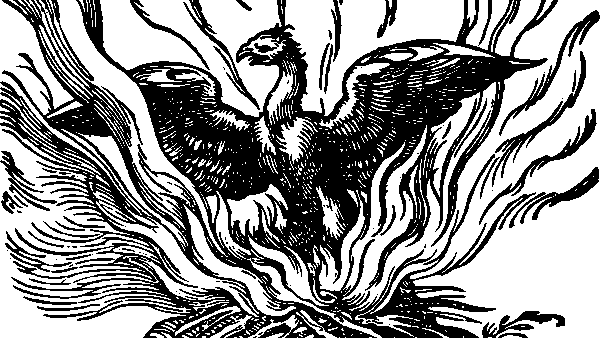I was surprised by Snow: it’s very different from John Banville’s usual style. There’s some beautiful prose as usual, but in the end it’s quite a formulaic detective novel.
I was really surprised by this book. I’ve read several books by John Banville before and am a great admirer of his prose style (see my reviews of Birchwood, The Sea and The Infinities. So when I came across Snow in a second-hand bookshop in Barbados, I was looking forward to reading it.

What I got, instead of Banville’s usual literary fiction, was a fairly standard detective novel set in 1950s Ireland. It wasn’t bad, but it was quite predictable.
From the start, we get all the hallmarks of a very standard crime novel in the Agatha Christie tradition. There’s an old country house full of quirky characters, and the novel opens with a body in the library. Then the detective turns up and begins interviewing people, all of whom seem potentially guilty for different reasons.
The characters all feel like people we’ve met before:
- The stuffy and domineering old colonel
- The perenially ill wife
- The precocious teenage daughter
- The rakish, disreputable brother-in-law
- The loyal old housekeeper
- The oddball stable boy
- The emotionally stunted detective
- The plodding police sergeant
- The salt-of-the-earth pub landlord
- The flirty barmaid
There are so many clichés, in fact, that they seem deliberate. Banville even calls attention to them multiple times.
“Very much a type, was Colonel Osborne. A type that Strafford was thoroughly familiar with.”
“It was too much like the last scene of a drawing-room melodrama, with the curtain about to come down and the audience getting ready to applaud.”
“‘Jesus Christ, will you look at this place,’ he wheezed. ‘Next thing Poirot himself will appear on the scene.'”
“‘It’s a library,’ he muttered incredulously to Hendricks. ‘It’s an actual fucking library, and there’s a body in it!'”
“Everyone seemed to be in a costume, seemed to be dressed for a part. They were like a cast of actors milling about in the wings, waiting to go on.”
All of this made me think that Banville was setting up the clichés in order to overturn them or at least complicate them in some way. But, unless I’m missing something very big, it never happens. The novel just progresses along the usual lines until the murderer is revealed just before the end.
On top of that, the resolution itself is quite predictable. I mean, if I tell you that the murder victim is a Catholic priest and that he was castrated when he died, you can probably guess the motive, right? So as soon as we find out that one of the characters grew up at a children’s home run by Catholic priests, it’s like, “OK, case closed.” There is a bit of a twist at the end, but not much.
For some reason, though, the detective is slow on the uptake and pursues all sorts of dead ends. He also spends time getting pursued by every woman and girl in the story, even though he doesn’t seem very appealing.
What’s surprising is that throughout his career, Banville has carved out separate writing identities: he’s published Booker Prize-winning literary fiction as John Banville, and detective novels as Benjamin Black. Snow seems to be an attempt to combine both, which could have worked well—a truly innovative literary crime novel is something I’d definitely read. I loved Emily Maguire’s An Isolated Incident, which is along those lines. But Snow just felt like a formulaic crime novel with touches of Banville’s beautiful writing.
I realise I’ve been quite negative in this review, perhaps more than the novel deserves. I didn’t hate it—actually, I quite enjoyed it. Banville’s a very good writer, even when he’s writing a novel that’s very far from his best work. It all moves along well, and the constant snow is a nice extended metaphor for the secrets blanketing the house. I guess the reason for my negativity is because I know what kind of beautiful literary fiction Banville can create and was expecting something more like that.
If you like familiar, traditional detective novels, by all means give Snow a try. But if you want to see the best of Banville, try something like Birchwood or The Infinities.




There are 8 comments
We read this for our crime book club a year or so ago and I can say that even as crime readers we did not find it satisfying, so I completely understand your disappointment. There have been some quite inventive reversal of crime tropes recently (both in books and in cinema), so I was expecting this to be similar, but no… and the detective was just too implausibly beset by romantic attention.
Hi Marina Sofia, Yes, the romantic side was very implausible, wasn’t it? And I just thought with the way that Banville was deliberately calling attention to the cliches and tropes that he would be sure to overturn them at some point, so it felt bizarre that he didn’t. I agree that reversing the tropes can be very satisfying—An Isolated Incident was very good at that, and I also enjoyed a Ghanaian book called Tail of the Blue Bird which played with the conventions very successfully. I’d recommend those two for your crime book club!
Interesting. Do you think he was going for funny? Maybe poking fun with a bit of pastiche? Or maybe he was under contract and was having a hard time coming up with something at the time and this was the result? It does say a lot about a writer though when even a not so great book is still pretty darn good.
Interesting idea! I don’t think he was going for a pastiche, though—and if he was, it was WAY too subtle. The examples I gave were scattered throughout the book, and overall the feeling was not of pastiche or comedy but just a standard detective novel. But you’re right, it’s impressive when even something that’s way off his best work is still enjoyable. I’m still an admirer of Banville and the way he writes, so although this one disappointed me, I’ll still read whatever he produces next.
As a member of the Anglo-Irish class, I was surprised and disappointed at Banville’s failure to paint a better picture of the household in question. People like the Osbornes would never have eaten in the kitchen, or taken a dog for a walk – it might, say, have accompanied someone going to check the yearlings in the river field; it would then have then been left in the yard, not allowed back into the house to shake wetness everywhere.
The laziness of the writing goes further – in the unlikely event that the daughter was familiar with the names and smells of agricultural weedkiller, it could not have been Paraquat, which was not available until the 1960s. And in 1957 a Morris Minor could not have been as ancient as portrayed . I don’t just blame Banville – he was badly let down by his editor.
Hi John, Thanks for pointing out those details. It’s not a time or place I’m familiar with, so it’s good to hear from someone who knows it so well. It’s very surprising that Banville made those mistakes since I thought this setting was quite close to his own background. Or perhaps, if the setting were less familiar, he would have researched the details better, and his editor would have made more effort to check them.
I found the book at our local library where the cover copy identified Snow as the first of the Quirke\Strafford series. In the end Quirke is mentioned once by name in a non-medical context. But, man the cold and snow set a mood. If that gets you going, try it. Otherwise quite a failure on any levels. Sad.
Hi Stephanie, It’s interesting how many different covers there can be for the same novel. Mine gave no mention of Quirke or Strafford, so I didn’t realise it was crime fiction at all—I assumed it was part of Banville’s literary work. Anyway, you’re right about that cold and snow setting a mood! Good to remember something positive about it 🙂